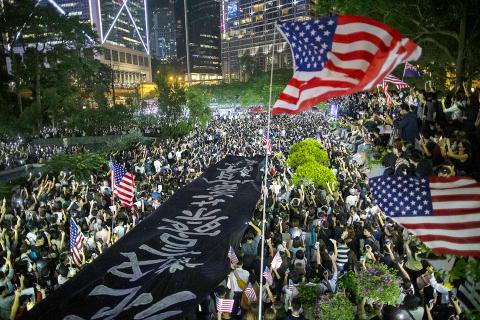Hong Kong Chief Executive Carrie Lam (林鄭月娥) yesterday said “it’s totally irresponsible and unfounded” to suggest that the territory is becoming a police state, as her government grapples with protests now in their fifth month.
In a spirited defense of Hong Kong’s 30,000-strong police force and her handling of the protests against criticism from visiting US senators, Lam challenged the notion that the territory is losing its freedoms, unique in China, as police battle demonstrators in the streets.
“I would challenge every politician to ask themselves if the large extent of violent acts, and all those petrol bombs and arson and deadly attacks on policemen, happened in their own country, what would they do? What would their policemen do?” Lam said. “So my simple response is: To describe Hong Kong as a police state is totally unfounded.”

Photo: Bloomberg
Critics have accused Lam’s government and the police of heavyhandedness, and some US lawmakers — including Senator Josh Hawley — are trying to pass legislation that would make Hong Kong’s special trading status subject to annual reviews of its political situation.
Hawley, a sponsor of the Hong Kong human rights and democracy act, had said during a weekend visit to the territory that it was “in danger of sliding towards a police state.”
The Missouri senator said he was standing by his statement.
“I chose the words ‘police state’ purposely — because that is exactly what Hong Kong is becoming. I saw it myself,” Hawley tweeted.
“If Carrie Lam wants to demonstrate otherwise, here’s an idea: resign,” he wrote.
Lam’s comments came as a Hong Kong court addressed one of the most startling cases of violence so far, involving an 18-year-old charged with intentional wounding for a slashing attack on a police officer on Sunday.
The court adjourned what would have been a first hearing for Hui Tim-lik (許添力), because the high-school student is still in a hospital in the wake of his arrest.
Police said the charge carries a possible sentence of up to life imprisonment.
The teen was initially detained on a preliminary charge of attempted murder.
Although not the first case during the protests of intentional wounding, the attack has attracted particular attention because it involved a sharp blade, described as a box cutter by Hong Kong media, and was caught on news media video.
Police said the riot control officer required surgery for the cut that severed a nerve.
The court adjourned the case to Friday or earlier if Hui is discharged from the hospital before then.
About a dozen friends, neighbors and supporters of the teen, some in black, which has become the color of protest in Hong Kong, were in court for the proceedings.

CHAOS: Iranians took to the streets playing celebratory music after reports of Khamenei’s death on Saturday, while mourners also gathered in Tehran yesterday Iranian Supreme Leader Ayatollah Ali Khamenei was killed in a major attack on Iran launched by Israel and the US, throwing the future of the Islamic republic into doubt and raising the risk of regional instability. Iranian state television and the state-run IRNA news agency announced the 86-year-old’s death early yesterday. US President Donald Trump said it gave Iranians their “greatest chance” to “take back” their country. The announcements came after a joint US and Israeli aerial bombardment that targeted Iranian military and governmental sites. Trump said the “heavy and pinpoint bombing” would continue through the week or as long

TRUST: The KMT said it respected the US’ timing and considerations, and hoped it would continue to honor its commitments to helping Taiwan bolster its defenses and deterrence US President Donald Trump is delaying a multibillion-dollar arms sale to Taiwan to ensure his visit to Beijing is successful, a New York Times report said. The weapons sales package has stalled in the US Department of State, the report said, citing US officials it did not identify. The White House has told agencies not to push forward ahead of Trump’s meeting with Chinese President Xi Jinping (習近平), it said. The two last month held a phone call to discuss trade and geopolitical flashpoints ahead of the summit. Xi raised the Taiwan issue and urged the US to handle arms sales to

State-run CPC Corp, Taiwan (CPC, 台灣中油) yesterday said that it had confirmed on Saturday night with its liquefied natural gas (LNG) and crude oil suppliers that shipments are proceeding as scheduled and that domestic supplies remain unaffected. The CPC yesterday announced the gasoline and diesel prices will rise by NT$0.2 and NT$0.4 per liter, respectively, starting Monday, citing Middle East tensions and blizzards in the eastern United States. CPC also iterated it has been reducing the proportion of crude oil imports from the Middle East and diversifying its supply sources in the past few years in response to geopolitical risks, expanding

An Emirates flight from Dubai arrived at Taiwan Taoyuan International Airport yesterday afternoon, the first service of the airline since the US and Israel launched strikes against Iran on Saturday. Flight EK366 took off from the United Arab Emirates (UAE) at 3:51am yesterday and landed at 4:02pm before taxiing to the airport’s D6 gate at Terminal 2 at 4:08pm, data from the airport and FlightAware, a global flight tracking site, showed. Of the 501 passengers on the flight, 275 were Taiwanese, including 96 group tour travelers, the data showed. Tourism Administration Deputy Director-General Huang He-ting (黃荷婷) greeted Taiwanese passengers at the airport and